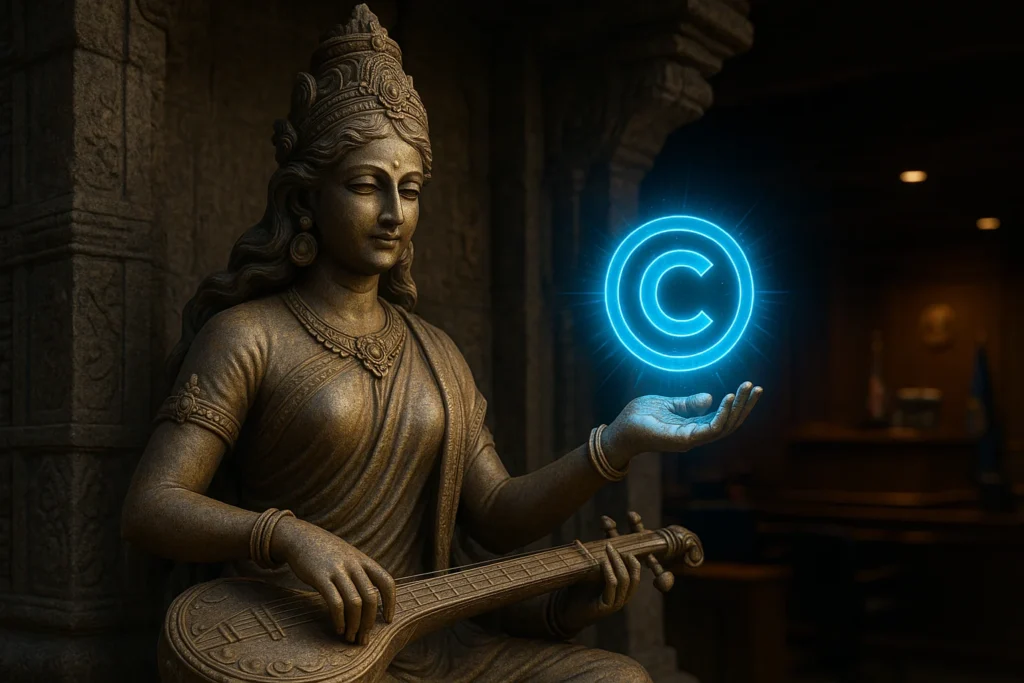In a world driven by innovation, creativity, and technology, Intellectual Property Law acts as a powerful legal tool to protect the rights of creators, inventors, businesses, and artists. Whether it’s a blockbuster Bollywood script, a new pharma formula, a catchy brand logo, or a mobile app—you can’t afford to leave your work vulnerable to copying or misuse. That’s where IP law steps in.
Table of Contents

What is Intellectual Property (IP)?
Intellectual Property (IP) refers to intangible assets that are the result of intellectual efforts—things that are created by the mind. These include:
- Inventions (protected by patents)
- Literary and artistic works (protected by copyright)
- Brand names and logos (protected by trademarks)
- Designs, trade secrets, and geographical indications
The core idea behind IP law is to grant creators legal rights over their creations so they can control how it is used and benefit commercially from it.

What is Intellectual Property Law?
Intellectual Property Law is a specialized field of law that governs the legal rights associated with creations of the human mind, often referred to as “intellectual property” (IP). These creations include inventions, artistic and literary works, designs, symbols, names, and images used in commerce. The primary objective of intellectual property law is to provide creators and inventors with exclusive rights over their works, thereby incentivizing creativity, innovation, and investment in new ideas.
Nature and Scope of Intellectual Property Law
Intellectual property is fundamentally intangible; it comprises the products of human intellect rather than physical objects. However, the law recognizes these creations as valuable assets, granting their creators certain exclusive rights to use, exploit, and benefit from them. These rights are collectively known as Intellectual Property Rights (IPRs). IPRs typically allow the creator to prevent others from using their creation without permission, usually for a limited period, after which the work may enter the public domain.

Key Statutes Governing IP in India
India has developed a robust legal framework to protect various forms of intellectual property. The key statutes include:
- The Copyright Act, 1957: Protects original literary, dramatic, musical, and artistic works, as well as cinematograph films and sound recordings. It grants authors exclusive rights to reproduce, distribute, and perform their works, among other rights.
- The Patents Act, 1970: Provides protection for inventions that are new, involve an inventive step, and are capable of industrial application. Patent holders have exclusive rights to prevent others from making, using, selling, or importing their patented inventions without consent.
- The Trade Marks Act, 1999: Safeguards distinctive signs, logos, or expressions that distinguish goods or services of one business from another. Trademark registration confers exclusive rights to use the mark and take action against infringement.
- The Designs Act, 2000: Protects the visual design of objects that are not purely utilitarian. Registered designs grant the owner exclusive rights to use and license the design.
- The Geographical Indications of Goods (Registration and Protection) Act, 1999: Protects products that have a specific geographical origin and possess qualities or a reputation attributable to that origin, such as Darjeeling tea or Kanchipuram silk.
- The Protection of Plant Varieties and Farmers’ Rights Act, 2001: Grants rights to breeders of new plant varieties and recognizes the contributions of farmers in conserving, improving, and making available plant genetic resources.
Other relevant laws include the Semiconductor Integrated Circuits Layout-Design Act, 2000, and principles from the Indian Contract Act, 1872, which cover trade secrets and undisclosed information1.

Administration and Enforcement
The administration of IP laws in India is divided among several government bodies:
- The Controller General of Patents, Designs, and Trade Marks (CGPDTM) oversees patents, designs, trademarks, and geographical indications, operating under the Department for Promotion of Industry and Internal Trade (DPIIT), Ministry of Commerce and Industry.
- The Copyright Office, under the Ministry of Human Resource Development, manages copyright matters.
- The Protection of Plant Varieties and Farmers’ Rights Authority, Ministry of Agriculture, administers plant variety rights.
International Treaties and Common Law Principles
India is a signatory to several international treaties, most notably the Agreement on Trade-Related Aspects of Intellectual Property Rights (TRIPS), which sets minimum standards for IP protection globally. India is also a member of the World Intellectual Property Organization (WIPO), aligning its laws with international norms and facilitating cross-border protection of IP.
Judicial interpretations and common law principles further shape the landscape of IP law in India, especially in areas not explicitly covered by statutory provisions, such as trade secrets and unfair competition.
Purpose and Importance
The overarching goal of intellectual property law is to strike a balance between the interests of creators and the public. By granting time-limited monopolies, IP law encourages innovation and creativity while eventually ensuring public access to new knowledge and cultural works. In the Indian context, the National IPR Policy of 2016 encapsulates this vision, aiming for a “Creative India; Innovative India” and promoting awareness, protection, and commercialization of IP assets.
In summary, intellectual property law in India is a comprehensive legal regime that protects the rights of creators, fosters innovation, and aligns with international standards, ensuring that the fruits of intellectual labour are recognized and rewarded.
Intellectual Property Law and Its Importance in India?
India is undergoing a profound transformation. With a digital revolution, growing startup ecosystem, and a surge in research and development, the country has become a fertile ground for innovation. Here’s why IP law is crucial:
1. Economic Growth & Innovation
IP rights encourage innovation. When inventors and entrepreneurs know their work will be protected, they’re more likely to take risks and invest in new ideas. This fuels economic development and competitiveness.
2. Start-up & Creative Ecosystems
Start-ups rely heavily on innovative ideas and brand identity. For them, securing a trademark or patent is as important as funding. Similarly, digital artists, authors, and musicians depend on copyright to safeguard their work.
3. Global Trade & Treaties
India is part of the WTO and complies with the TRIPS Agreement, which sets global standards for IP protection. Adherence to these norms builds confidence among foreign investors and facilitates international trade.
4. Cultural & Traditional Knowledge Protection
India’s cultural heritage is vast—from Banarasi sarees to Darjeeling tea. Through Geographical Indications (GI), communities can preserve their unique products and gain recognition and income from them.
5. Attracting Investment
Strong IP regimes are linked to increased FDI and R&D funding, as investors prefer markets where their innovations are legally protected.
6. Legal Enforcement & Deterrence
IP law provides mechanisms for litigation and enforcement. From injunctions and damages to criminal penalties, India’s evolving legal system empowers rights holders against infringers.

The Future of Intellectual Property Law in India
India’s transition into a knowledge-driven economy is placing intellectual property (IP) law at the center of its innovation and economic growth strategies. As technology rapidly evolves, the IP landscape in India is undergoing significant transformation, presenting both new opportunities and challenges for lawmakers, businesses, and creators alike.
Emergence of Digital IP and Technological Disruption
The rise of digital technologies-such as artificial intelligence (AI), blockchain, big data, and the Internet of Things (IoT)-is fundamentally altering the way intellectual property is created, managed, and protected. The proliferation of digital assets has led to a surge in disputes over domain names, copyright and trademark infringement, and cybersecurity breaches. As more business activity shifts online, safeguarding digital intellectual property has become a top priority, prompting courts and regulators to adapt existing legal frameworks to address these novel issues in Intellectual Property Laws.
AI-Generated Content and Legal Ownership
One of the most pressing challenges for IP law in India is the question of ownership and protection of AI-generated content. While the Indian Copyright Act, 1957, currently emphasizes human authorship, the rise of generative AI systems capable of producing original works has sparked debate over whether such creations can be owned, and by whom. The law presently recognizes the person who causes a computer-generated work to be created as the author, but this approach is being tested by increasingly autonomous AI systems.
There is a growing consensus among legal scholars and policymakers that legislative amendments may be necessary to clarify the status of AI-generated works, drawing inspiration from international best practices and ongoing global debates. Until then, ownership of AI-generated content in India will depend on the degree of human involvement, contractual agreements, and judicial interpretation.
NFTs, Data Privacy, and Emerging Assets
The advent of non-fungible tokens (NFTs) and the increasing importance of data privacy are also reshaping the IP landscape. NFTs, which authenticate ownership of digital assets on the blockchain, raise complex questions about copyright, licensing, and enforcement in virtual environments. Data privacy regulations intersect with IP law, especially as personal data becomes a valuable intangible asset for businesses. These developments demand a fresh legal lens and agile regulatory responses to ensure robust protection without stifling innovation.
Patent Protection and Legal Reforms
India is witnessing a surge in patent filings, particularly in technology-driven sectors such as biotechnology, pharmaceuticals, semiconductors, and green energy. Recent reforms to the Indian Patent Rules have streamlined the process for inventors, reduced examination timelines, and enhanced procedural efficiency, making India a more attractive destination for innovation and investment. These changes are positioning the country as a global player in IP-intensive industries.
Globalization and International Collaboration
As Indian companies expand their operations globally, managing international IP portfolios has become essential. India’s active participation in global treaties-such as the TRIPS Agreement, Patent Cooperation Treaty (PCT), and Madrid Protocol-facilitates cross-border protection and enforcement of IP rights. This internationalization is expected to drive further harmonization of Indian IP laws with global standards.
In summary, the future of IP law in India is dynamic and multifaceted, shaped by technological innovation, legal reform, and global integration. As new frontiers such as AI, NFTs, and digital assets continue to emerge, India’s IP regime will need to evolve-balancing the protection of creators and inventors with the broader goals of innovation, economic growth, and public interest
Want to explore Distinct Career options in Intellectual Property Law.
Check out our full blog on “What are career options in Intellectual Property Law?” for detailed explanations, legal provisions, and real-world applications.
[…] what role do they play in shaping our creative and industrial future?👉 Read our in-depth blog on “What is Intellectual Property Law?” to explore the full landscape with real-life examples, Indian statutes, and global […]
[…] The implications extend far beyond the courtroom, influencing business strategies, creative practices, and the fundamental relationship between humans and machines in the creative economy. While the door remains open for Congressional action to modify these rules, the current legal framework strongly emphasizes the irreplaceable value of human creativity in intellectual property law. […]